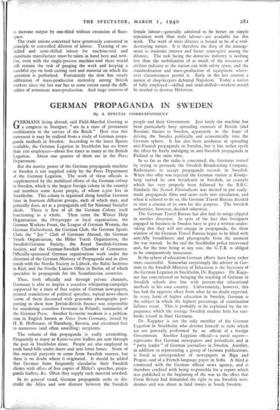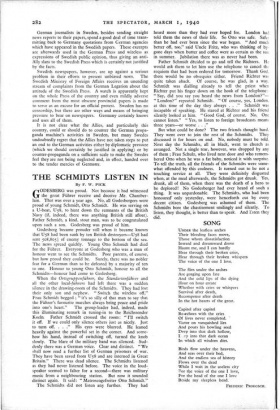GERMAN PROPAGANDA IN SWEDEN
By A. SPECIAL CORRESPONDENT
GERMANS living abroad, said Field-Marshal Goering at a congress in Stuttgart, " are in a state of permanent mobilisation in the service of the Reich." How true this statement is may be realised from a study of German propa- ganda methods in Sweden. According to the latest figures available, the German Legation in Stockholm has no fewer than too employees—about five times as many as the British Legation. About one quarter of them are in the Press Department.
But the motive power of the German propaganda machine in Sweden is not supplied solely by the Press Department of the German Legation. The work of these officials is supplemented by the mobilised efforts of the German colony in Sweden, which is the largest foreign colony in the country and numbers some 6,000 people, of whom 2,50o live in Stockholm. This colony is organised along familiar German lines in fourteen different groups, each of which may, and generally does, act as a propaganda cell for National Socialist ideals. There is first of all the German Colony itself functioning as a whole. Then come the Winter Help Organisation, the Ortsgruppe or local organisation, the German Workers Front, the League of German Women, the German Kulturbund, the German Club, the German Sports Club, the " Joy " Club of Germans Abroad, the German Youth Organisation, the Hider Youth Organisation, the Swedish-German Society, the Royal Swedish-German Society, and the German-Swedish Chamber of Commerce. Officially-sponsored German organisations work under the direction of the German Ministry of Propaganda and in close touch with the Nordic Society in Liibeck, the Baltic Institute in Kiel, and the Nordic Liaison Office in Berlin, all of which specialise in propaganda for the Scandinavian countries.
Thus, both officially and through private channels, Germany is able to inspire a ceaseless whispering-campaign supported by a mass of free copies of German newspapers, printed translations of political speeches, topical news-sheets (some of them decorated with gruesome photographs pur- porting to show how Jewish-British finance was responsible for murdering countless Germans in Poland), summaries of the German Press. Another favourite medium is a publica- tion in English known as News from Germany, issued by H. R. Hoffmann, of Stamberg, Bavaria, and circulated free to numerous (and often unwilling) recipients.
The volume of this propaganda is really astonishing. Frequently as many as 8,000-io,000 leaflets are sent through the post in Stockholm alone. People are also employed to push hand-bills under doors and into letter boxes. Some of this material purports to come from Swedish sources, but there is no doubt where it originated. It should be added that German firms frequently circularise their Swedish clients with offers of free copies of Hider's speeches, propa- ganda leaflets, &c. Often they supply such material unasked.
In its general trend, German propaganda seeks to dis- credit the Allies and sow distrust between the Swedish people and their Government. Just lately the machine has been particularly busy spreading rumours of British (and Russian) threats to Sweden, apparently in the hope of driving the Swedes politically and economically into the German sphere. It has also been assiduous in spreading anti-Finnish propaganda in Sweden, but it has rather spoilt the effect by freely indulging in anti-Swedish propaganda in Finland at the same time.
In so far as the radio is concerned, the Germans started by trying to persuade the Swedish Broadcasting Company, Radiotjanst, to accept propaganda records in Swedish. When this offer was rejected the German station at Konigs- berg started its own broadcasts in Swedish, an example which has very properly been followed by the B.B.C. Similarly the Svensk Filmindustri was invited to put ready- made propaganda films and news reels into circulation, and when it refused to do so, the German Travel Bureau decided to start a cinema of its own for this purpose. The Swedish authorities, however, decided otherwise.
The German Travel Bureau has also had its wings clipped in another direction. In spite of the fact that foreigners engaged in business in Sweden have to give a written under- taking that they will not engage in propaganda, the show window of the German Travel Bureau began to be filled with anti-Ally broadsheets and photographs from the moment the war started. In the end the Stockholm police intervened and, for the time being at any rate, the G.T.B. is obliged to be comparatively innocuous.
In the sphere of education German efforts have been rather more successful. Somewhat surprisingly the adviser in Ger- man to the Swedish Ministry of Education is the Secretary of the German Legation in Stockholm, Dr. Kappner. Dr. Kapp- ner has concentrated on bringing the teaching of German in Swedish schools into line with present-day educational methods in his own country. Unfortunately, however, this has had the opposite effect from what he no doubt expected. In every form of higher education in Sweden, German is the subject in which the highest percentage of examination failures occur. This is probably to be explained by the re- pugnance which the average Swedish student feels for text- books issued in Nazi Germany.
Dr. Kappner is not the only member of the German Legation in Stockholm who devotes himself to tasks which are not generally performed by an official of a foreign Government. Another Legation official—a naval expert— represents five German newspapers and periodicals and is " party leader " of German journalists in Sweden. Another, in addition to representing a group of German publications, is listed as correspondent of newspapers in Riga and Prague, and of a French-language paper in Sofia. A third is connected with the German official news agency, and is therefore credited with being responsible for a report which was published at the beginning of the war to the effect that Great Britain had demanded the right to use Swedish aero- dromes and was about to land troops in South Sweden. German journalists in Sweden, besides sending straight news reports to their papers, spend a good deal of time trans- mitting back to Germany quotations from German agencies which have appeared in the Swedish papers. These excerpts are afterwards used in the German Press and wireless as expressions of Swedish public opinion, thus giving an anti- Ally slant to the Swedish Press which is certainly not justified by the facts.
Swedish newspapers, however, are up against a serious problem in their efforts to present unbiased news. The Swedish Ministry of Foreign Affairs receives an unending stream of complaints from the German Legation about the attitude of the Swedish Press. A watch is apparently kept on the whole Press of the country and even mildly adverse comment from the most obscure provincial papers is made to serve as an excuse for an official protest. Sweden has no censorship, but there are other ways and means of bringing pressure to bear on newspapers. Germany certainly knows and uses all of them.
It is not clear what the Allies, and particularly this country, could or should do to counter the German propa- ganda machine's activities in Sweden, but many Swedes undoubtedly regret that the Allies have not taken steps to put an end to the German activities either by diplomatic pressure (which we should certainly be justified in applying) or by counter-propaganda on a sufficient scale to make the Swedes feel they are not being neglected and, in effect, handed over to the tender mercies of Germany.















































 Previous page
Previous page